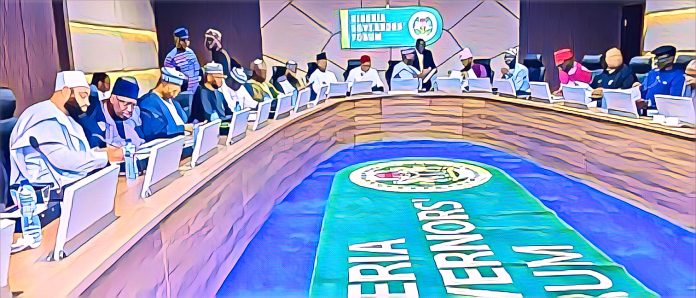In a response to the escalating food crisis and economic challenges plaguing Nigeria, state governors under the aegis of the Nigeria Governors Forum (NGF) have embarked on various proactive measures aimed at mitigating these hardships for citizens across the nation. As detailed in a report released by the NGF Secretariat, these initiatives are part of a broader strategy to tackle the pressing issues of economic hardship and hunger that have raised concerns about the governors’ effectiveness in addressing such critical problems.
The forum, through a statement by Halimah Ahmed, Acting Head of Media at the NGF Secretariat, highlighted the concerted efforts being made by state governors. A pivotal meeting between President Bola Tinubu and all 36 state governors focused on discussing strategies to overcome these challenges, with President Tinubu emphasizing his commitment to steering Nigeria towards economic and social prosperity. The meeting also addressed measures against hoarding of commodities to ensure food accessibility and price control, alongside President Tinubu’s focus on economic reforms, including the removal of fuel subsidies, which are anticipated to yield positive outcomes soon.
State governors, in collaboration with President Tinubu’s administration, are actively seeking to provide relief to citizens grappling with these challenges, reflecting a commitment to improving the well-being of Nigerians amidst tough economic conditions. For instance, in Akwa Ibom State, Governor Umo Eno is working on establishing an agency to sell food items at lower prices, demonstrating a direct response to the food crisis. Similar efforts are seen in Kano State, where officials raided warehouses to combat food hoarding, and in Yobe State, where the government banned bulk grain purchases to prevent hoarding and export across borders.
Further illustrating the governors’ initiatives, Niger State’s Governor Mohammed Umar Bago has implemented measures against the mass purchase of foodstuffs, and Enugu State’s Governor Peter Mbah has pledged to eradicate hunger and poverty through agricultural investments. These actions signify a multifaceted approach by the governors to tackle the immediate and underlying issues contributing to the food crisis and economic hardship.
The NGF report also showcases significant investments in agriculture, as seen in Ekiti State, where the government has allocated substantial funds to enhance food production and transform the livestock subsector, aiming to boost productivity and engage youth in livestock businesses. Moreover, Zamfara State’s Governor Dauda Lawal is seeking partnerships to grow the state’s economy and address hardships, demonstrating an openness to international collaboration for economic development.
Governor Abdulrahman Abdulrazaq of Kwara State, along with other governors, is engaging with the Federal Ministry of Agriculture and Food Security to push for increased crop production and tackle food inflation. This initiative is critical in addressing the effectiveness of previous programs and ensuring food security for the Nigerian populace.
Furthermore, the involvement of state governors in the federal government’s agriculture initiatives reflects a collective effort to improve agricultural outcomes and food security in Nigeria. This is complemented by the recent meeting between President Tinubu and the state governors, which focused on the hike in food prices and economic hardship, underscoring the urgent need for collaborative solutions to these challenges.
In summary, the NGF report underscores a comprehensive and coordinated effort by state governors, in collaboration with the federal government, to address the food crisis and economic challenges in Nigeria. Through targeted interventions, policy reforms, and partnerships, the governors are actively working to mitigate the impact of these issues on the citizens, aiming to ensure food security, economic stability, and the overall well-being of Nigerians in these challenging times.
Source: The Sun Nigeria



